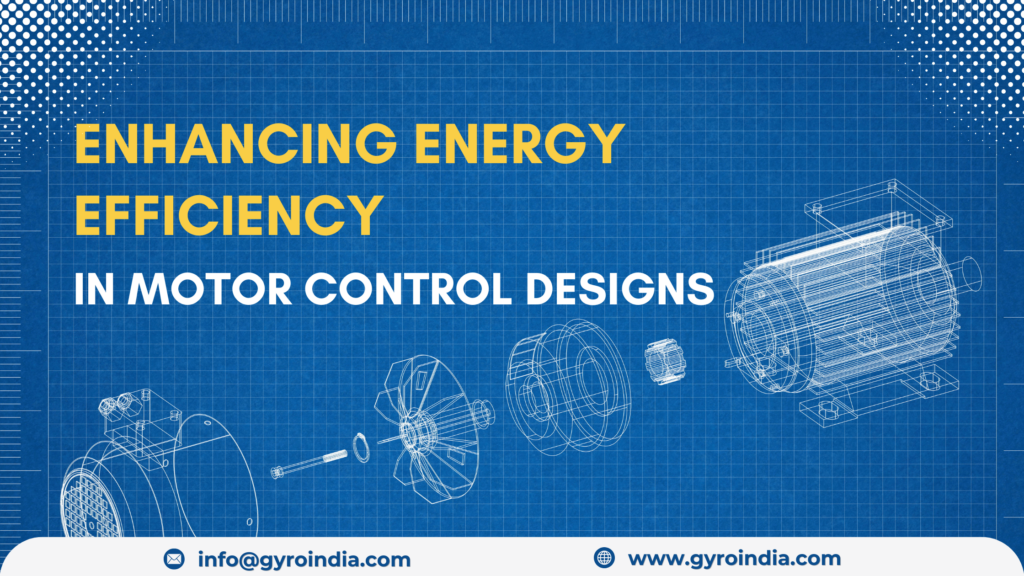Enhancing Energy Efficiency in Motor Control Designs
 The drive for environmental sustainability is reshaping industries worldwide, making energy efficiency in motor control designs a critical focus. Motors are at the heart of countless applications, from powering electric vehicles (EVs) to operating consumer appliances, and their efficiency directly impacts both performance and sustainability. Let’s explore how industries can achieve high energy efficiency in motor control designs while aligning with environmental goals.
The drive for environmental sustainability is reshaping industries worldwide, making energy efficiency in motor control designs a critical focus. Motors are at the heart of countless applications, from powering electric vehicles (EVs) to operating consumer appliances, and their efficiency directly impacts both performance and sustainability. Let’s explore how industries can achieve high energy efficiency in motor control designs while aligning with environmental goals.
1. The Role of Motor Control in Energy Efficiency
Motor control designs are pivotal in optimizing energy usage across diverse applications. In automotive and industrial settings, where high power and precision are essential, innovative motor controllers can significantly reduce energy losses. By leveraging advanced algorithms, such as vector control and pulse-width modulation, motors can operate at optimal efficiency levels under varying loads.
For electric vehicles, high energy efficiency in motor control translates to extended driving ranges and faster charging times. In consumer electronics and home appliances, efficient motors ensure reduced electricity consumption, directly benefiting the end-users with lower utility bills while minimizing the carbon footprint.
2. Adopting Advanced Materials and Designs for Efficiency
High energy efficiency in motor control starts with selecting the right materials and designing for performance. Advanced winding techniques, enhanced thermal management systems, and reduced magnetic losses are just a few innovations driving the efficiency of motors today.
For instance, switched reluctance motors (SRMs) are emerging as game-changers due to their simpler construction and superior efficiency at high speeds. Additionally, motors with reduced or no reliance on rare-earth magnets are gaining traction, as they align with sustainability goals while offering robust performance.
3. Digitization and Smart Monitoring for Enhanced Control
Digital technologies are unlocking new levels of efficiency in motor control designs. By integrating IoT-enabled sensors and cloud-based analytics, manufacturers can achieve real-time monitoring and predictive maintenance.
For example, smart systems can analyze operational data to detect inefficiencies or impending faults, allowing for timely interventions. This reduces energy wastage caused by faulty motors or suboptimal performance. Additionally, adaptive controls powered by AI can dynamically adjust motor operations to match the demand, ensuring minimal energy usage at all times.
4. Regulatory Compliance and Market Competitiveness
With global regulations becoming increasingly stringent, achieving high energy efficiency in motor control designs is no longer optional—it’s a necessity. Standards like the International Energy Efficiency (IE3, IE4) classifications are pushing manufacturers to innovate and deliver better-performing motors.
For the automotive industry, meeting these efficiency benchmarks is crucial for aligning with carbon reduction targets. Similarly, appliance manufacturers must adhere to eco-design requirements to maintain market competitiveness. By prioritizing high energy efficiency, organizations not only ensure compliance but also appeal to eco-conscious consumers.
5. Gyrodrive’s Commitment to Energy-Efficient Innovations
At Gyrodrive Machineries, we recognize the transformative potential of high energy efficiency in motor control designs. Our patented solutions, including magnet-free motors, redefine efficiency while addressing the environmental impact of traditional motor technologies.
By focusing on lightweight, high-performance designs, we cater to automotive manufacturers aiming for greater EV ranges, as well as consumer electronics companies seeking more energy-efficient appliances. With over 70% of our R&D investments dedicated to sustainable technologies, we’re committed to driving a greener future.
Final Thoughts: Driving Sustainability Through Efficiency
Achieving high energy efficiency in motor control designs is about more than reducing energy bills; it’s about creating a sustainable future. By embracing advanced materials, smart technologies, and regulatory frameworks, industries can meet the twin goals of operational excellence and environmental responsibility.
Whether you’re in the automotive sector, consumer electronics, or industrial manufacturing, energy-efficient motors are key to staying competitive in today’s eco-focused market. The journey toward sustainability starts with innovative motor control designs—and the future has never looked more promising.

Leave a Reply